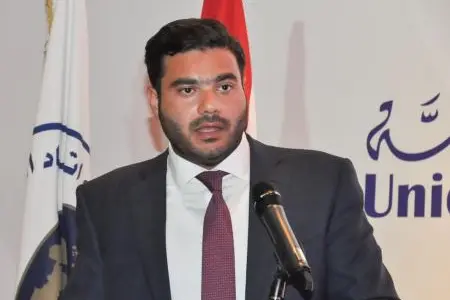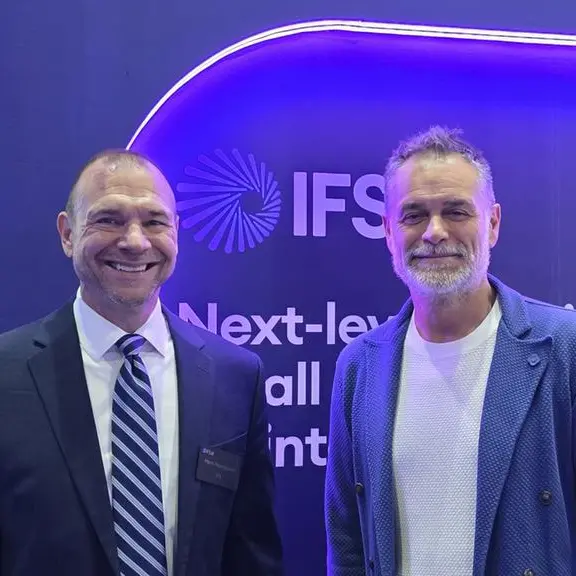PHOTO
Kuwait: In cooperation with the Central Bank of Egypt and the Federation of Egyptian Banks, KIB recently participated in the "Green Banking Forum: The Road to Sustainable Development" which was held in Hurghada. The Forum was organized by the Union of Arab Banks, with the attendance of a select group of banking and financial experts from all over the Arab world.
Over the course of three days, the event shed light on the concept of "Green Banking and Sustainable Development", and its economic, social and environmental aspects. The Forum also explored the impact of climate change on banking and financial services, as well as the role central and local banks plays in sustainable development through green banking. Furthermore, the Forum addressed the importance of digital transformation and the commitment to implementing government regulations to promote more advanced forms of technology, as well as the role social responsibility plays in achieving sustainable development.
Manager of the Corporate Communications Unit at KIB, Nawaf Najia, partook in the third session of the Forum, discussing KIB's leading role in social responsibility and sustainable development, a key component of its commitment to being a ‘Bank for Life’.
“KIB is currently embarking on a new phase of its storied history, and we are witnessing many changes that serve to realize its banking and social vision. KIB’s new strategy focuses on becoming more customer-centric by offering an integrated customer banking experience that delivers much more than just “banking” in the traditional sense - but rather establishes KIB as a partner in every aspect of its customers’ lives,” said Najia.
Najia added that over a short period of time, the Bank managed to establish its reputation as a ‘Bank for Life’ by participating in a number of national and community-based initiatives, activities, and events that serve all segments of the local community. These includes national, health, sports, environmental, cultural and educational, youth empowerment programs, and many more.
He also pointed out that the Bank's pioneering social responsibility program is currently focusing on two main areas: the KIB financial literacy program - which was launched as a unique initiative in Kuwait, aimed at enhancing financial and banking awareness among all segments of society, especially youth and children, who represent the future of this country. KIB also dedicates a big part of its efforts to supporting youth empowerment. The Bank is keen on capitalizing on its capabilities as a banking institution to support youth and students, maintaining this as one of its top priorities. KIB continues to be a firm believer in the importance of investing in national talents and the necessity of arming youth with skill and knowledge, given that they are the most important asset a country has.
KIB was also recognized for its efforts and contributions by a number of distinguished international bodies. One of the most notable achievements recently for KIB in this area was receiving the ‘Distinction in Social Responsibility in Islamic Banking 2017’ award from the Regional CSR Network. KIB also garnered the “Best CSR 2017” Award by Banker Middle East, marking the third consecutive time the Bank received the honor.
-Ends-
About KIB
Kuwait International Bank (KIB) is a bank that operates according to the Islamic Shari’ah, based in the State of Kuwait. Incorporated in 1973, and originally known as Kuwait Real Estate Bank, KIB made the transition to its current Islamic operating model in 2007.
KIB is a full service Bank operating through a network of branches spread across the State of Kuwait, and offering a broad range of banking products, services and solutions in accordance with the principles of the Islamic Shari’ah. The Bank’s mission and vision also encompasses a leading social responsibility program that aims at supporting every member of Kuwait’s society by spearheading a multitude of initiatives and activities.
In 2015, KIB embarked on a comprehensive strategic plan, aimed at improving the Bank’s performance indicators, as well as enhancing the quality of its products and services. The strategy focuses on propelling the Bank to the forefront of the Kuwaiti banking sector and setting it on a solid path to becoming the “Islamic Bank of Choice” in the market.
Today, KIB is in the midst of its new strategic transformation: a comprehensive and long-term program which is aimed at transforming the way KIB engages with customers across every touch point and communication channel. This new strategy focuses on offering a next-level customer experience that delivers much more than just “banking” in the traditional sense - but rather establishes KIB as a partner in every aspect of its customers’ lives; a true “bank for life”.
© Press Release 2018Disclaimer: The contents of this press release was provided from an external third party provider. This website is not responsible for, and does not control, such external content. This content is provided on an “as is” and “as available” basis and has not been edited in any way. Neither this website nor our affiliates guarantee the accuracy of or endorse the views or opinions expressed in this press release.
The press release is provided for informational purposes only. The content does not provide tax, legal or investment advice or opinion regarding the suitability, value or profitability of any particular security, portfolio or investment strategy. Neither this website nor our affiliates shall be liable for any errors or inaccuracies in the content, or for any actions taken by you in reliance thereon. You expressly agree that your use of the information within this article is at your sole risk.
To the fullest extent permitted by applicable law, this website, its parent company, its subsidiaries, its affiliates and the respective shareholders, directors, officers, employees, agents, advertisers, content providers and licensors will not be liable (jointly or severally) to you for any direct, indirect, consequential, special, incidental, punitive or exemplary damages, including without limitation, lost profits, lost savings and lost revenues, whether in negligence, tort, contract or any other theory of liability, even if the parties have been advised of the possibility or could have foreseen any such damages.




















